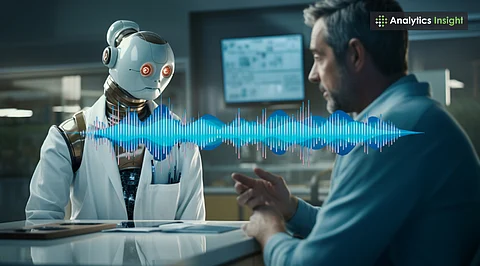

AI voice agents help reduce manual data entry and save time in clinical workflows.
Voice-powered documentation improves accuracy and minimizes clerical errors.
Healthcare professionals can focus more on patient care with less administrative burden.
In modern healthcare, maintaining accurate records is crucial for providing high-quality care and ensuring patient safety. However, traditional methods of documenting patient information can be time-consuming for physicians, reducing the time they can devote to patient care.
To address this issue, hospitals are now utilizing AI-powered voice technology. This technology is designed to generate medical notes more efficiently, simplifying the documentation process and improving accuracy.
By leveraging AI voice agents, healthcare providers can optimize their workflow and enhance patient care.
Doctors and nurses can spend hours a day putting notes into computer systems. This includes what happened with patients in the past, how they were diagnosed, the treatments they received, the medications they needed, and when they were discharged.
This work is needed, but it can be tiring. Writing things down by hand raises the chance of mistakes and delays in posting updates to medical information.
Over time, this can lead to fatigue and reduced job satisfaction among healthcare workers. In many hospitals, paperwork consumes more time than face-to-face patient care. This throws off the quality of patient care.
Also Read: AI in Indian Hospitals: How Startups Are Solving Worker Shortages
AI agents are computer programs that utilize AI to listen, comprehend, and transcribe spoken words into written text; thus, AI in healthcare starts putting things together. These programs teach doctors how to communicate effectively, including the use of medical words and phrases.
When a doctor uses a microphone or phone, the AI listens and turns their words into organized notes. Some systems can even communicate with computer systems, making it simple to update patient information right then and there.
The best ones can even condense conversations, extract key details, and suggest the next steps. These tools are designed to support doctors during patient interactions and also after their visits.
One of the best aspects of AI voice agents in healthcare is the significant time they save. Doctors can talk as they go, and the system types everything. This allows them to take notes more quickly and reduces the overtime they spend on paperwork.
Modern voice agents can recognize medical terms with great accuracy. This alleviates concerns about spelling errors, incorrect entries, or missing notes. If the records are correct, diagnoses are more accurate, and patients receive the right treatment plans.
If healthcare workers spend less time typing, they can spend more time hearing what patients have to say. This leads to more effective conversations and stronger patient relationships. When doctors pay attention during talks, patients are happier.
By performing simple tasks independently, voice agents alleviate some of the stress on healthcare workers. This can help relieve tiredness and enable medical teams to remain focused during work.
Some AI voice tools update the EHR in real time. This means that records are always up to date and ready for other departments in a matter of minutes. Emergency care, lab workers, and specialists can access the information without delays.
AI voice agents are now used in hospitals, clinics, and telehealth sites. In surgery, doctors use voice notes to record their actions as they perform them. In regular care, doctors record patient visits using phone apps linked to cloud systems. Mental health experts also get help from quick notes of therapy. This ensures that the records are detailed and private.
In rural areas, these tools are helpful because they make writing things down easy, eliminating the need for constant office presence.
Also Read: How AI Is Being Used in Medicine, Law, and Finance Today
Although the good things are clear, there are some concerns. AI systems still need to improve at recognizing accents, languages, and fast speech. Noise can hurt how they do. Data privacy is another worry, especially with cloud solutions that handle patient information.
Even with these issues, changes in how computers understand language and communicate are expected to make AI voice agents even more accurate and safe. With the correct teaching and system work, the future of healthcare writing is likely to be voice-driven.
AI voice agents are among the most important tools in today's healthcare settings. These systems offer valuable solutions to the challenges of handwriting by saving time, enhancing accuracy, and alleviating stress on doctors.
As technology changes, using voice will continue to grow while AI in healthcare becomes the most essential part of the system. With advancements and safety in mind, these tools will contribute to a better healthcare system for both workers and patients.
Q1. What is the main role of AI voice agents in healthcare?
A1. AI voice agents assist in converting spoken medical notes into accurate digital documentation.
Q2. How do AI voice tools save time for doctors?
A2. These tools enable doctors to speak instead of typing, reducing the time spent on manual data entry.
Q3. Can AI voice agents improve the accuracy of medical records?
A3. Yes, they reduce spelling errors and ensure correct use of medical terms in documentation.
Q4. Do AI voice systems support real-time EHR updates?
A4. Many AI voice agents can integrate with EHR systems to update patient records instantly.
Q5. What are the challenges of using AI voice agents in hospitals?
A5. Challenges include handling background noise, varied accents, and ensuring data privacy.
